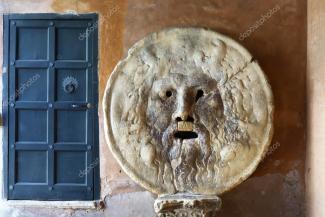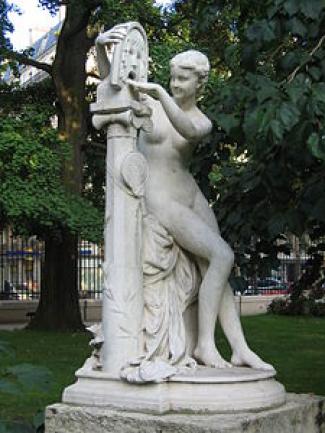Sermon given by Bishop Alan M. Gates at the Holy Tuesday Renewal of Ordination Vows and Blessing of Holy Oils service on April 16, 2019, at the Cathedral Church of St. Paul in Boston. Audio is available here.
Two weeks ago in Paris, wandering the Luxembourg Garden, I encountered a sculpture called “La Bouche de la Vérité” – the Mouth of Truth. Of course, I was curious. The 19th-century French sculpture by Jules Blanchard turns out to be an homage to another, more famous sculpture in Italy. The “Bocca della Verità” – the Mouth of Truth – in Rome is a huge round mask, over five feet in diameter, carved out of marble. It currently stands outside the church of Santa Maria in Cosmedin. Dating to about the first century; it might have been a fountain decoration, or a drain hole cover; it likely depicts some Roman god or other, though which one is widely debated.
In any case, the face is flat, the mouth is gaping. And according to legend, if you place your hand in the mouth of this stone mask and tell a lie, the jaws will clamp shut and your hand will be bitten off. This is a serious disincentive to telling a lie.
You might say that the Bocca della Verità is the original polygraph test. When I went to work for the government almost 40 years ago I had to take a polygraph test. The administrator asked a battery of questions designed to elicit candor, much like the Mouth of Truth. Was I applying for this job at the behest of anyone else? Did I have any contacts with foreign agents? Had I wet my bed since the age of 11? Some of the questions had evident connection to the job application; some of them were bizarre mind games. Like the Bocca della Verità, the polygraph is less about flawless discernment of the facts than it is about the motivation of fear.
Likewise, both the polygraph and the Bocca della Verità are prone to manipulation. There is a tale about the Bocca in which a woman is brought to the mask, having been accused of infidelity. Just as she is about to place her hand in the threatening mouth of the Bocca, a madman leaps from the crowd, embraces her passionately and dashes away. The woman then swears – hand firmly in the Bocca – that, other than this madman, she has never kissed anyone but her husband. Turns out, of course, that the wild man was her lover, feigning madness. The Bocca test had been manipulated, circumvented.
Most famously, perhaps, the Bocca was a plot device in the 1953 film "Roman Holiday," in which Audrey Hepburn and Gregory Peck, having been less than truthful with each other, encounter the Bocca anxiously. Well, it’s all a spectacle, of course. It’s just a game – a mythologized version of Truth or Dare.
Okay now, close your eyes and see where these descriptors take you: Laying claim to truth, but prone to manipulation. A bogus spectacle. Less about truth and more about motivating others by fear. Any chords struck here? These are themes which are all too current, are they not?
In my November address at Diocesan Convention I commended to you the document our Presiding Bishop Michael Curry has issued, along with two dozen other religious leaders – Reclaiming Jesus: A Confession of Faith in a Time of Crisis. The manifesto asserts that, we are in “perilous and polarizing times” with “the soul of the nation and the integrity of faith now at stake.” The document outlines six affirmations of Christian belief, together with the resulting rejection of practices antithetical to those beliefs. Here is the fourth of those affirmations:
WE BELIEVE that truth is morally central to our personal and public lives. Truth-telling is central to the prophetic biblical tradition, whose vocation includes speaking the Word of God into their societies and speaking the truth to power. A commitment to speaking truth, the ninth commandment of the Decalogue, “You shall not bear false witness” (Exodus 20:16), is foundational to shared trust in society. Falsehood can enslave us, but Jesus promises, “You will know the truth, and the truth will set you free.” (John 8:32). The search and respect for truth is crucial to anyone who follows Christ.
THEREFORE, WE REJECT the practice and pattern of lying that is invading our political and civil life. Politicians, like the rest of us, are human, fallible, sinful and mortal. But when public lying becomes so persistent that it deliberately tries to change facts for ideological, political or personal gain, the public accountability to truth is undermined. The regular purveying of falsehoods and consistent lying by the nation’s highest leaders can change the moral expectations within a culture, the accountability for a civil society, and even the behavior of families and children. The normalization of lying presents a profound moral danger to the fabric of society. In the face of lies that bring darkness, Jesus is our truth and our light. (i)
Last Thursday, in the cathedral’s preaching series on truth, I referenced this section of the Reclaiming Jesus document. Having shared also the legend of the Bocca, I named my determination to rededicate myself to speaking truth, to living with one hand perpetually fixed in the Bocca della Verità. Dean McCreath reflected that such an oath might connect directly to this week’s renewal of clergy vows. I believe it does. “Truth,” says the manifesto, “is morally central to our personal and public lives.”
Now, I have been reflecting on whether an invitation to renew your vows to be agents of truth would be received more as threat or promise. Most parish clergy I know view the prophetic aspect of our vocation to be a sacred trust. We know, as the Reclaiming Jesus manifesto says, that “truth-telling is central to the prophetic biblical tradition.” But for many it is also a challenging, even risky aspect of the vocation. There are times when vowing to be a truth-teller may seem very much like an invitation to have your hand – if not your head – bitten right off.
Which brings me back to the French version of this sculpture, the Blanchard “Bouche de la Vérité.” Take a look at what a different vision of accountability to truth is represented by the French sculpture. The posture of the French maiden towards the measure of her truthfulness is emphatically not one of fear. Here, truth is embraced, almost caressed. This image of truthfulness is not something to be feared, nor manipulated. It is, rather, an object of devotion and tender desire.
When I said last week that I imagined myself living with one hand perpetually fixed in the Bocca della Verità, I was still thinking in terms of a sort of external accountability. But the image of the French sculpture presents something different. If the ancient Italian Bocca presents itself as a cross between the polygraph and the guillotine, the French Bouche de la Vérité presents more as an approachable oracle. Here we have not an external (and somewhat threatening) motivator to be an agent of truth, but a companion and helper in discerning what that truth is.
So when I suggest that our renewal of vows today reflects the vow to be agents of the truth, I intend not the vocational annihilation that could result from conforming yourself to the particular style of Jeremiah and Elijah. Rather, I rely on the Johannine promise that, by God’s grace, we will know the truth, and the truth will set us free. [John 8:32] The framers of the Reclaiming Jesus manifesto have put it well: “The search and respect for truth is crucial to anyone who follows Christ.” In the face of lies that bring darkness, may Jesus be our truth and our light.
At a time when the soul of our nation, the future of our planet and the integrity of faith now seem very much at stake, I invite us all to rededicate ourselves to be agents of Christ’s truth and light.
At the consecration in Paris last week, I was struck anew by two of the questions posed in the examination of the ordinand. [The Book of Common Prayer, p. 518] The first was this: Will you boldly proclaim and interpret the Gospel of Christ, enlightening the minds and stirring up the conscience of your people? Just the prophetic ministry we have been considering.
But then there was this: Will you encourage and support all baptized people in their gifts and ministries, nourish them from the riches of God’s grace, pray for them without ceasing, and celebrate with them the sacraments of our redemption? It is precisely in the context of this encouragement, support, nourishment and sacramental celebration – and by virtue of the trust we have built in so doing with our people – that we are able, by God’s grace, to “stir up the conscience” of those same people. We can challenge them precisely because we have loved them.
Nourish them from the riches of God’s grace. Honestly, the beauty of those words smote my heart last week. How else can we do any of that to which we are called, you and I, but by “the riches of God’s grace?”
Dear friends: I bid you, nourish your people from the deep riches of God’s grace Nourish them with the sacraments of our redemption. As ever, I hope that you love what you do. I hope that you know how much God loves you for what you do. And I hope that you will find, in renewing your vows this day, a renewed measure of determination and grace.
In Jesus’ Name. Amen.
(i) Reclaiming Jesus: A Confession of Faith in a Time of Crisis, full document and study resources available at www.reclaimingjesus.org.


